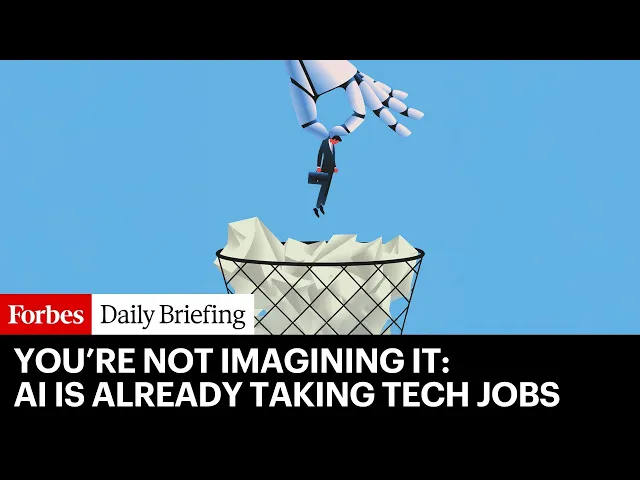You’re Not Imagining It: AI Is Already Taking Tech Jobs

AI is already taking tech jobs
There's a profound shift happening in the technology job market, and the culprit is the same innovation many tech workers have been enthusiastically building: artificial intelligence. Recent data and industry observations suggest this isn't a distant threat on the horizon but a transformation actively unfolding right now. The implications for software engineers, designers, and other technical professionals are becoming increasingly clear as companies recalibrate their hiring practices in response to AI capabilities.
Key developments reshaping the tech job landscape
- Tech companies are slowing hiring while maintaining output, with major players like Meta, Microsoft, and Google demonstrating they can develop products with fewer engineers than before thanks to AI-assisted development tools
- Early-career positions are disproportionately affected, creating a "missing generation" of junior developers as AI handles tasks that would traditionally provide on-ramps to the industry
- The remaining jobs are evolving to require hybrid AI management skills rather than pure coding, with successful candidates increasingly needing to demonstrate expertise in prompt engineering and AI integration
The quiet restructuring of tech workforces
Perhaps the most significant insight from this trend is how silently the transformation is occurring. Unlike previous technological disruptions that announced themselves with fanfare, AI's impact on tech employment is manifesting as hiring freezes, quiet team reductions, and changing job requirements rather than dramatic announcements.
This subtlety makes the shift more dangerous for workers. There's no clear moment to point to as "the day AI took over," just a gradual realization that teams aren't growing as they once did, despite companies delivering more features and products than ever. This pattern aligns with broader economic indicators suggesting a decoupling of productivity and employment growth across sectors where AI adoption is highest.
Beyond the headline statistics
While the video focuses primarily on software development roles, the AI transformation extends throughout adjacent technical fields. Consider design teams at major platforms, where AI image generation and layout tools are reshaping workflows. At one Fortune 500 company I've consulted with, a design team that previously employed 12 full-time designers now operates with just five, supplemented by Midjourney and DALL-E integrations that handle iterations and variations of core design concepts.
Similarly, the quality assurance profession has seen dramatic restructuring. Traditional manual testing roles have largely disappeared at forward-
Recent Videos
How To Earn MONEY With Images (No Bullsh*t)
Smart earnings from your image collection In today's digital economy, passive income streams have become increasingly accessible to creators with various skill sets. A recent YouTube video cuts through the hype to explore legitimate ways photographers, designers, and even casual smartphone users can monetize their image collections. The strategies outlined don't rely on unrealistic promises or complicated schemes—instead, they focus on established marketplaces with proven revenue potential for image creators. Key Points Stock photography platforms like Shutterstock, Adobe Stock, and Getty Images remain viable income sources when you understand their specific requirements and optimize your submissions accordingly. Specialized marketplaces focusing...
Oct 3, 2025New SHAPE SHIFTING AI Robot Is Freaking People Out
Liquid robots will change everything In the quiet labs of Carnegie Mellon University, scientists have created something that feels plucked from science fiction—a magnetic slime robot that can transform between liquid and solid states, slipping through tight spaces before reassembling on the other side. This technology, showcased in a recent YouTube video, represents a significant leap beyond traditional robotics into a realm where machines mimic not just animal movements, but their fundamental physical properties. While the internet might be buzzing with dystopian concerns about "shape-shifting terminators," the reality offers far more promising applications that could revolutionize medicine, rescue operations, and...
Oct 3, 2025How To Do Homeless AI Tiktok Trend (Tiktok Homeless AI Tutorial)
AI homeless trend raises ethical concerns In an era where social media trends evolve faster than we can comprehend them, TikTok's "homeless AI" trend has sparked both creative engagement and serious ethical questions. The trend, which involves using AI to transform ordinary photos into images depicting homelessness, has rapidly gained traction across the platform, with creators eagerly jumping on board to showcase their digital transformations. While the technical process is relatively straightforward, the implications of digitally "becoming homeless" for entertainment deserve careful consideration. The video tutorial provides a step-by-step guide on creating these AI-generated images, explaining how users can transform...
